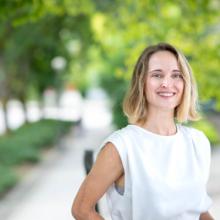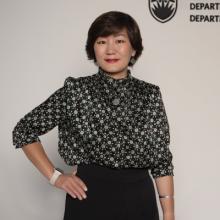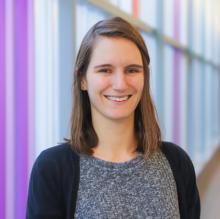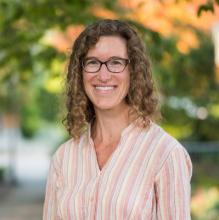By foregrounding the importance of connection, as it relates to the creation of partnerships with people beyond the academy, Public Scholarship allows emerging scholars to think of their knowledge and abilities in ways that transfer outside of the university classroom, laboratory, and library. In doing so, it offers an alternative view of the purpose of a doctoral degree and the possible futures it can create.
Research Description
My research explores the different ways young people communicate information through Internet memes, paying particular attention to how memetic storytelling factors into issues surrounding digital citizenship (e.g., fake news, copyright, cyberbullying, privacy, etc.).
What does being a Public Scholar mean to you?
To me, being a public scholar means devoting time and energy to exploring questions that are relevant to people’s lives. It means reflecting deeply on the possible value my research holds to communities beyond the walls of academia and accepting the responsibility to share the knowledge it generates with them in accessible and engaging ways.
In what ways do you think the PhD experience can be re-imagined with the Public Scholars Initiative?
I think the Public Scholars experience provides PhD students with a different foundation on which to build their sense of confidence as professional researchers. By foregrounding the importance of connection, as it relates to the creation of partnerships with people beyond the academy, it allows emerging scholars to think of their knowledge and abilities in ways that transfer outside of the university classroom, laboratory, and library. In doing so, it offers an alternative view of the purpose of a doctoral degree and the possible futures it can create. By shifting one’s focus away from traditional PhD pathways, it provides a means through which to escape some of the negative discourses surrounding the job market. In fact, it expands one’s sense of the job market to encompass professional opportunities beyond that of the tenure-track professorship. Freeing oneself from the expectation or belief that a PhD has to lead to one outcome can help students embrace the joy of pursuing their research interests for the sake of the research itself.
How do you envision connecting your PhD work with broader career possibilities?
As someone who has an interdisciplinary academic background, I have been continuously surprised and inspired by the connections that can be made between different research areas. Through my interactions with various communities of researchers and practitioners, I hope to gain a better sense of the ways my work can help enhance people’s lives, and consequently, what career I would most like to pursue post-graduation. I would love to work with youth, educators, information professionals, designers, and policymakers in various capacities. I am open to a career in academia or industry, but would prefer one that allows me to maintain connections with both.
How does your research engage with the larger community and social partners?
My research focuses on Internet memes as a form of online communication. As a relatively new phenomenon, these popular digital texts affect global and local communities of people, who use them to create, share, and interpret information in their daily lives. My research seeks to highlight the various ways young people engage with Internet memes by working with students to investigate their own meme practices. I am partnering with a teacher to co-design an educational unit on Internet memes that will allow students to develop meme-related research projects that align with the new B.C. curriculum. This unit will include an exploration of the relationship between Internet memes and the issues surrounding digital citizenship (e.g., fake news, copyright, cyberbullying, privacy, etc.). The aim of this collaborative project is to provide students with an opportunity to shape how the new curriculum is being taught in schools and to provide educators with possible instructional designs to use in their classrooms.
Why did you decide to pursue a graduate degree?
I decided to pursue a graduate degree because I am passionately curious when it comes to learning more about the world. The opportunity to explore possible answers to my questions both excites me and gives me a strong sense of purpose. I enjoy developing my awareness of important issues and the ways my skills can be employed to help navigate them. I deeply appreciate the chances the graduate research experience gives me to grow as a human being.
Why did you choose to come to British Columbia and study at UBC?
I chose to study at UBC for many reasons, one of them being that I was able to find a department where my interdisciplinary aspirations were supported and actively encouraged. Finding a supervisor whose interests and experience complemented my own also played a significant role in influencing my decision. My previous academic experiences at UBC had provided me with the foundation for my doctoral research and the stimulating intellectual environment that would make it possible.
What is it specifically, that your program offers, that attracted you?
The PhD program at UBC iSchool embraces interdisciplinary approaches to research that provide important opportunities for knowledge exchange among scholars. I find it stimulating to be surrounded by supportive faculty and colleagues who are exploring such different areas of academic inquiry. The variety of perspectives represented, and the generative dialogues they create, enriches my understanding of the possibilities and implications of my own research.
For you, what was the best surprise about graduate life, about UBC or life in Vancouver?
The size of the UBC campus can be intimidating at first, but it is amazing at how quickly it allows you to find the various ways you fit into the diverse community of scholars. The relationships you form with the different networks of people you meet not only offer you a sense of place, but also a sense of the different places your research might take you.
What aspect of your graduate program do you enjoy the most or are looking forward to with the greatest curiosity?
I love the opportunities for collaborative research that my program offers and the friendships they have allowed me to create with my colleagues. I am also really excited and grateful for the mentorship I receive from my supervisor and other faculty members, who are helping me develop my skills as a researcher. Curiosity-wise, I am looking forward to working with youth and learning from them as experts on their own social media use!
What do you see as your biggest challenge(s) in your future career?
Interdisciplinary research offers many opportunities when engaging in academic study, but it can also pose challenges when navigating the hiring practices of different disciplines. Probably the biggest challenge for me after I finish this degree will be identifying where I will be best-suited to work within the academy or outside of it.
How do you feel your program is preparing you for those challenges?
The iSchool encourages its students to attend a variety of conferences that allow them to form a sense of community by networking with different people in their respective areas of research. The faculty also support students' professional development by requiring them to design researcher profiles. The creation of these profiles force students to reflect on and articulate a more coherent identity for themselves.
What aspects of your life or career before now have best prepared you for your UBC graduate program?
Academically speaking, completing an honours essay during my undergraduate degree and a thesis during my master's degree have helped prepare me for my current graduate program. Personally speaking, I have a very supportive family that has had to navigate the challenges of a longstanding illness with one of its members. Illness puts life into perspective and can lead to a constant renegotiation of priorities. Also, having the inspiring example of someone fight through sickness motivates you not to give up.
What do you like to do for fun or relaxation?
I like going to the Vancouver Symphony with my sisters and cousin, as well as spending time with the rest of my family and friends. Walking in nature is a really relaxing activity for me, but laughing is probably the most relaxing thing I do for fun. I am blessed to have people in my life who make me laugh. It helps me keep things in perspective when I am tempted to take situations too seriously!
Do you have any tips for students from your home country coming to Canada / to UBC Grad School?
Make time to develop friendships with colleagues in your program. The challenges of graduate life are easier when you have people to navigate them with. Also, it is important to celebrate each other's progress! When we help each other succeed we all move forward.
Being a public scholar means devoting time and energy to exploring questions that are relevant to people’s lives. It means reflecting deeply on the possible value my research holds to communities beyond the walls of academia and accepting the responsibility to share the knowledge it generates with them in accessible and engaging ways.




